-
 Bitcoin
Bitcoin $83,818.1285
1.19% -
 Ethereum
Ethereum $1,813.8273
1.27% -
 Tether USDt
Tether USDt $0.9997
-0.01% -
 XRP
XRP $2.1250
3.48% -
 BNB
BNB $596.7493
0.64% -
 Solana
Solana $121.2008
5.27% -
 USDC
USDC $1.0000
0.01% -
 Dogecoin
Dogecoin $0.1698
4.33% -
 Cardano
Cardano $0.6591
1.51% -
 TRON
TRON $0.2375
-0.84% -
 UNUS SED LEO
UNUS SED LEO $9.1951
-4.76% -
 Chainlink
Chainlink $12.8892
1.68% -
 Toncoin
Toncoin $3.3131
-5.81% -
 Stellar
Stellar $0.2583
-0.21% -
 Avalanche
Avalanche $18.1653
0.47% -
 Sui
Sui $2.2414
3.02% -
 Shiba Inu
Shiba Inu $0.0...01231
1.76% -
 Hedera
Hedera $0.1635
1.61% -
 Litecoin
Litecoin $84.7103
1.75% -
 Polkadot
Polkadot $4.0184
0.11% -
 MANTRA
MANTRA $6.2827
-1.26% -
 Bitcoin Cash
Bitcoin Cash $300.9919
-0.81% -
 Bitget Token
Bitget Token $4.5306
1.27% -
 Dai
Dai $1.0000
-0.01% -
 Ethena USDe
Ethena USDe $0.9991
-0.04% -
 Monero
Monero $217.9472
1.03% -
 Hyperliquid
Hyperliquid $11.9562
2.18% -
 Uniswap
Uniswap $5.8865
0.68% -
 Pepe
Pepe $0.0...07249
7.38% -
 OKB
OKB $50.7987
8.70%
Why can NFT be used to sell music and videos?
NFTs revolutionize music and video sales by enabling direct artist-to-fan transactions, offering unique experiences, and providing verifiable ownership on blockchain platforms.
Apr 04, 2025 at 02:14 am
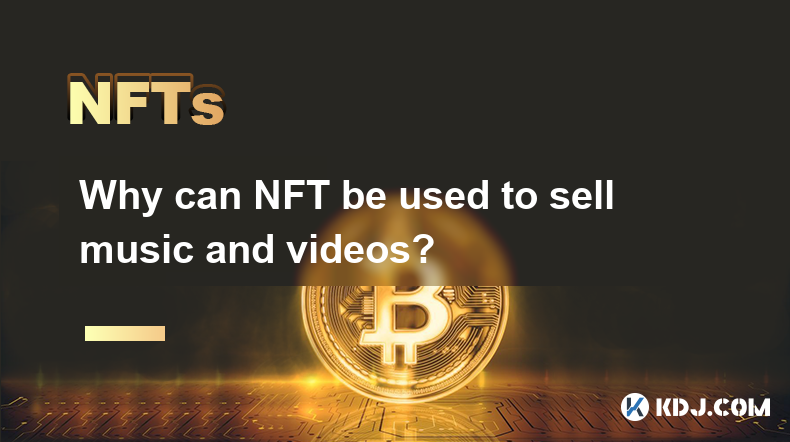
Non-Fungible Tokens (NFTs) have emerged as a revolutionary tool in the world of digital assets, particularly in the realm of music and video. The unique ability of NFTs to represent ownership of specific digital items makes them an ideal solution for selling music and videos. This article will explore the reasons why NFTs are suitable for this purpose, delving into their unique properties, the benefits they offer to creators and buyers, and the technological framework that supports their use.
NFTs are unique digital assets that cannot be replicated or exchanged on a one-to-one basis with other tokens. This uniqueness is crucial for selling music and videos, as it allows each piece of content to be represented as a distinct token. When an artist creates an NFT for a song or video, they are essentially minting a digital certificate of ownership that can be bought, sold, or traded on various blockchain platforms.
The Benefits of NFTs for Music and Video Creators
One of the primary benefits for creators is the ability to monetize their work directly. Traditional platforms often take a significant cut of the revenue, but with NFTs, artists can sell their music and videos directly to their audience, retaining a larger portion of the profits. This direct-to-consumer model empowers creators and gives them more control over their earnings.
NFTs also enable artists to offer unique experiences and rewards to their fans. For instance, an artist might release an NFT that includes exclusive access to behind-the-scenes content, virtual meet-and-greets, or even a share in future royalties. This not only enhances the value of the NFT but also fosters a deeper connection between the artist and their audience.
The Benefits of NFTs for Buyers
For buyers, NFTs offer a way to own a piece of digital culture. Owning an NFT for a song or video means having a verifiable proof of ownership that can be displayed and traded. This sense of ownership can be particularly appealing to fans who want to support their favorite artists and have a tangible connection to their work.
Additionally, NFTs can appreciate in value over time, especially if the artist gains more popularity or if the NFT includes additional perks. This potential for appreciation makes NFTs an attractive investment opportunity for buyers, who can purchase them as collectibles or speculative assets.
The Technological Framework Supporting NFTs
NFTs are built on blockchain technology, which provides a secure and transparent way to record ownership and transactions. Each NFT is linked to a specific piece of content through a unique identifier, ensuring that it cannot be duplicated or altered. This technology is what allows NFTs to function as verifiable proof of ownership for digital assets like music and videos.
The most commonly used blockchain for NFTs is Ethereum, which supports the creation and trading of NFTs through its ERC-721 and ERC-1155 token standards. These standards define how NFTs are created, managed, and transferred, providing a robust framework for the digital asset market.
How NFTs Revolutionize the Music and Video Industry
The use of NFTs in the music and video industry is revolutionizing how content is created, distributed, and consumed. By enabling direct sales and offering new ways for artists to engage with their audience, NFTs are breaking down traditional barriers and opening up new opportunities for creativity and innovation.
For instance, artists can use NFTs to experiment with new formats and business models. They can release limited edition NFTs that offer unique experiences or collaborate with other artists to create joint NFTs that combine their talents. These innovative approaches not only enhance the value of the NFTs but also enrich the overall experience for fans.
Challenges and Considerations
While NFTs offer many benefits, there are also challenges and considerations that need to be addressed. One of the main concerns is the environmental impact of blockchain technology, particularly the energy consumption associated with some blockchains like Ethereum. However, efforts are underway to transition to more sustainable solutions, such as Ethereum's move to a proof-of-stake consensus mechanism.
Another consideration is the need for education and awareness about NFTs. Many people are still unfamiliar with the concept and may be hesitant to invest in digital assets. Artists and platforms need to provide clear information and guidance to help potential buyers understand the value and potential of NFTs.
The Future of NFTs in Music and Video
The future of NFTs in the music and video industry looks promising, with continued growth and innovation on the horizon. As more artists and platforms adopt NFTs, we can expect to see new ways of engaging with fans and monetizing content. The technology is still evolving, and there is much potential for further development and refinement.
In conclusion, NFTs are transforming the way music and videos are sold and consumed, offering unique benefits to both creators and buyers. As the technology continues to evolve, it will be exciting to see how it shapes the future of the digital asset market.
Common Questions:
What makes NFTs suitable for selling music and videos?
NFTs are suitable for selling music and videos because they are unique digital assets that represent ownership of specific content. This uniqueness allows artists to sell their work directly to their audience, offering exclusive experiences and rewards while retaining a larger portion of the profits.
How do NFTs benefit music and video creators?
NFTs benefit creators by enabling direct sales, which means they can retain a larger portion of the revenue. Additionally, NFTs allow artists to offer unique experiences and rewards to their fans, fostering a deeper connection and enhancing the value of their work.
What are the advantages for buyers of music and video NFTs?
Buyers of music and video NFTs gain a verifiable proof of ownership, which can be displayed and traded. NFTs can also appreciate in value over time, making them an attractive investment opportunity. Additionally, owning an NFT provides a tangible connection to the artist's work.
What technological framework supports NFTs?
NFTs are built on blockchain technology, with Ethereum being the most commonly used platform. Ethereum supports the creation and trading of NFTs through its ERC-721 and ERC-1155 token standards, which provide a secure and transparent way to record ownership and transactions.
How are NFTs revolutionizing the music and video industry?
NFTs are revolutionizing the music and video industry by enabling direct sales, offering new ways for artists to engage with their audience, and allowing for innovative formats and business models. This is breaking down traditional barriers and opening up new opportunities for creativity and innovation.
What are some challenges and considerations with NFTs in the music and video industry?
Some challenges include the environmental impact of blockchain technology and the need for education and awareness about NFTs. Efforts are being made to address these issues, such as transitioning to more sustainable blockchain solutions and providing clear information to potential buyers.
What does the future hold for NFTs in the music and video industry?
The future of NFTs in the music and video industry looks promising, with continued growth and innovation expected. As more artists and platforms adopt NFTs, we can anticipate new ways of engaging with fans and monetizing content, further shaping the digital asset market.
Disclaimer:info@kdj.com
The information provided is not trading advice. kdj.com does not assume any responsibility for any investments made based on the information provided in this article. Cryptocurrencies are highly volatile and it is highly recommended that you invest with caution after thorough research!
If you believe that the content used on this website infringes your copyright, please contact us immediately (info@kdj.com) and we will delete it promptly.
- NORDO, a New Crypto Project, Captures Attention by Mixing Humor, Politics, and Polar Bears
- 2025-04-05 13:20:12
- Coreum's role in institutional blockchain adoption
- 2025-04-05 13:20:12
- More Bitcoin, says Michael Saylor as BTC price breaks out
- 2025-04-05 13:15:12
- Solana (SOL) Tests Key Support Levels as Market Gauges the Potential for Either a Major Decline or a Recovery to New All-Time Highs
- 2025-04-05 13:15:12
- Dogecoin (DOGE) Market Trends Could Be Mirroring Larger Economic Shifts
- 2025-04-05 13:10:12
- DePIN Summit Africa 2025 Announced for July 2nd in Mombasa and July 4-5th in Zanzibar
- 2025-04-05 13:10:12
Related knowledge
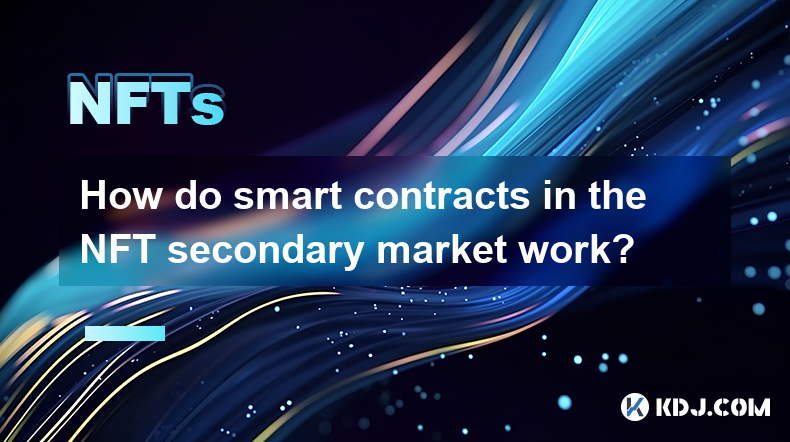
How do smart contracts in the NFT secondary market work?
Apr 03,2025 at 07:14am
Smart contracts play a pivotal role in the NFT secondary market, facilitating seamless transactions and enforcing predefined rules. These self-executing contracts with the terms of the agreement directly written into code are stored on the blockchain. In the context of NFTs, smart contracts automate the buying, selling, and transferring of digital asset...
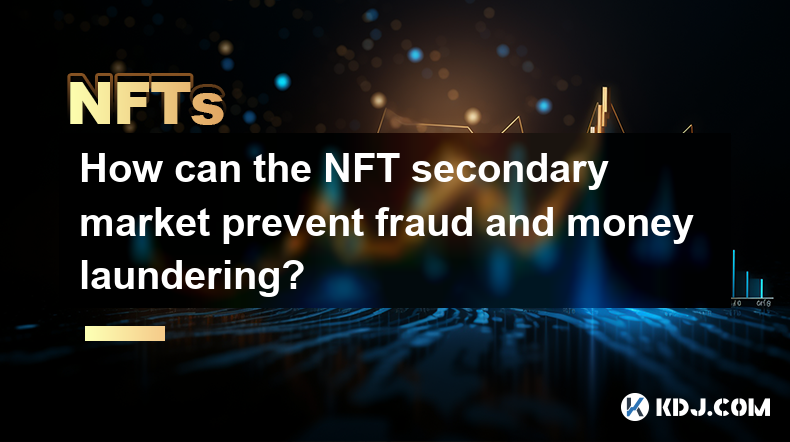
How can the NFT secondary market prevent fraud and money laundering?
Apr 03,2025 at 08:35am
The NFT secondary market has become a thriving hub for digital art and collectibles, but it also faces challenges in preventing fraud and money laundering. To tackle these issues, the market can implement various strategies and technologies to ensure a safer and more transparent trading environment. This article will explore how the NFT secondary market...
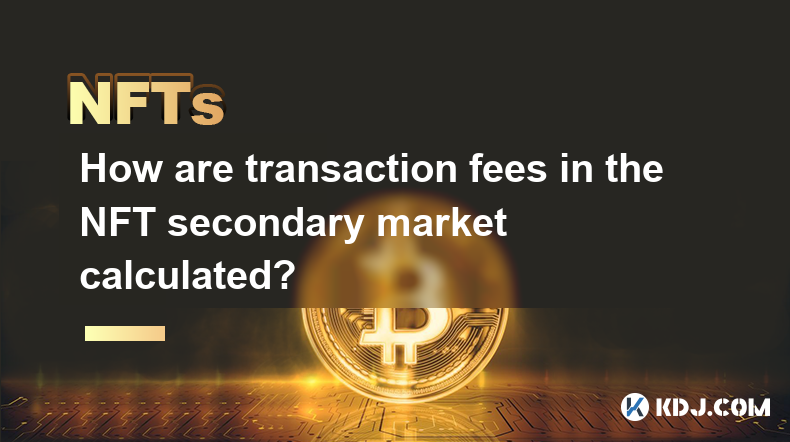
How are transaction fees in the NFT secondary market calculated?
Apr 04,2025 at 05:28am
The calculation of transaction fees in the NFT secondary market is a crucial aspect that both buyers and sellers need to understand. These fees can significantly impact the overall cost of transactions and the profits that sellers can make. In this article, we will delve into the various components that make up these fees, how they are calculated, and w...
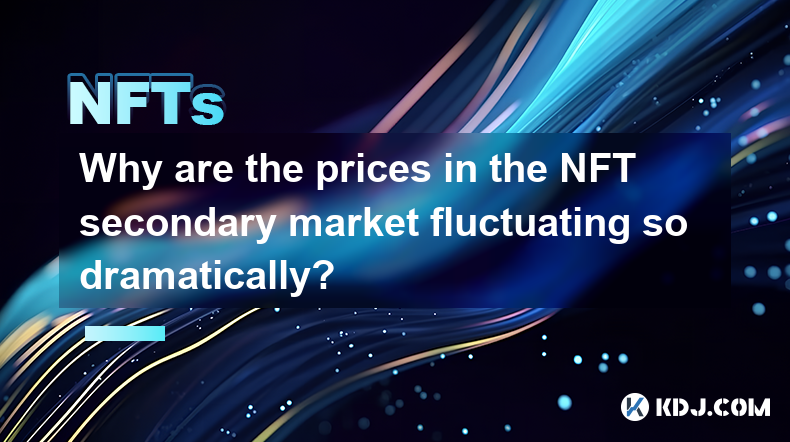
Why are the prices in the NFT secondary market fluctuating so dramatically?
Apr 03,2025 at 10:35pm
The NFT secondary market has been experiencing dramatic price fluctuations, leaving many in the cryptocurrency community puzzled and curious. To understand this phenomenon, it's essential to delve into the factors driving these price movements. From the impact of market sentiment and celebrity endorsements to the role of speculation and the unique natur...
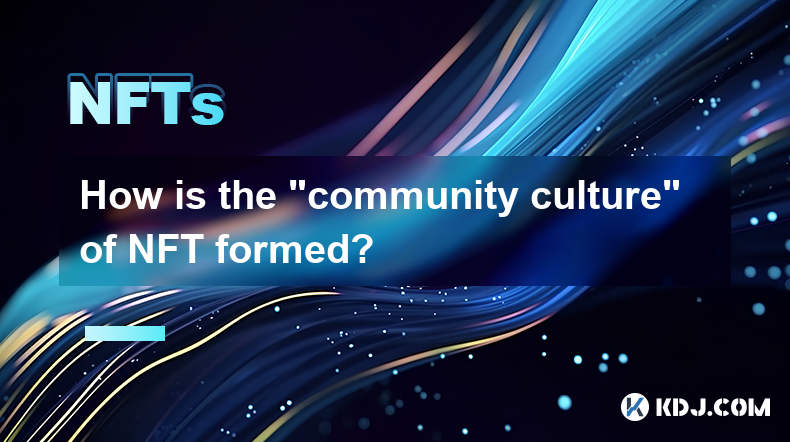
How is the “community culture” of NFT formed?
Apr 03,2025 at 11:07am
The formation of the 'community culture' within the NFT (Non-Fungible Token) space is a fascinating and multi-faceted process. It involves various elements such as shared interests, active engagement, and the creation of a sense of belonging among members. NFT communities often revolve around specific projects or artists, fostering a unique environment ...
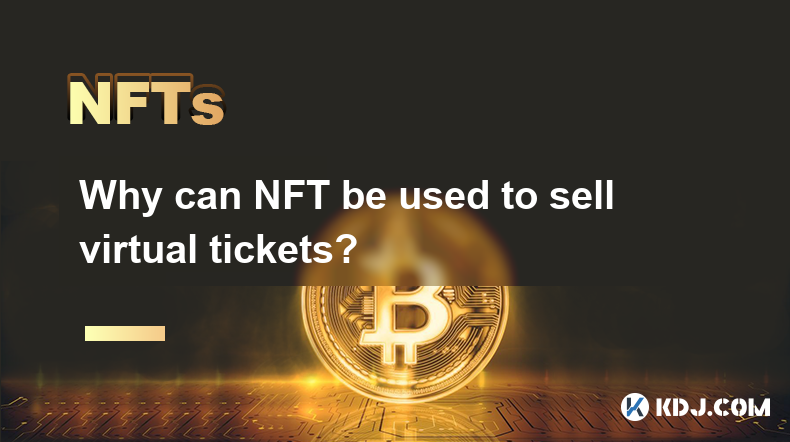
Why can NFT be used to sell virtual tickets?
Apr 03,2025 at 01:35pm
NFTs, or Non-Fungible Tokens, have revolutionized the way we think about digital ownership and value, particularly in the realm of virtual tickets. The primary reason NFTs can be used to sell virtual tickets is their unique nature. Unlike cryptocurrencies such as Bitcoin or Ethereum, which are fungible and can be exchanged on a one-to-one basis, NFTs ar...

How do smart contracts in the NFT secondary market work?
Apr 03,2025 at 07:14am
Smart contracts play a pivotal role in the NFT secondary market, facilitating seamless transactions and enforcing predefined rules. These self-executing contracts with the terms of the agreement directly written into code are stored on the blockchain. In the context of NFTs, smart contracts automate the buying, selling, and transferring of digital asset...

How can the NFT secondary market prevent fraud and money laundering?
Apr 03,2025 at 08:35am
The NFT secondary market has become a thriving hub for digital art and collectibles, but it also faces challenges in preventing fraud and money laundering. To tackle these issues, the market can implement various strategies and technologies to ensure a safer and more transparent trading environment. This article will explore how the NFT secondary market...

How are transaction fees in the NFT secondary market calculated?
Apr 04,2025 at 05:28am
The calculation of transaction fees in the NFT secondary market is a crucial aspect that both buyers and sellers need to understand. These fees can significantly impact the overall cost of transactions and the profits that sellers can make. In this article, we will delve into the various components that make up these fees, how they are calculated, and w...

Why are the prices in the NFT secondary market fluctuating so dramatically?
Apr 03,2025 at 10:35pm
The NFT secondary market has been experiencing dramatic price fluctuations, leaving many in the cryptocurrency community puzzled and curious. To understand this phenomenon, it's essential to delve into the factors driving these price movements. From the impact of market sentiment and celebrity endorsements to the role of speculation and the unique natur...

How is the “community culture” of NFT formed?
Apr 03,2025 at 11:07am
The formation of the 'community culture' within the NFT (Non-Fungible Token) space is a fascinating and multi-faceted process. It involves various elements such as shared interests, active engagement, and the creation of a sense of belonging among members. NFT communities often revolve around specific projects or artists, fostering a unique environment ...

Why can NFT be used to sell virtual tickets?
Apr 03,2025 at 01:35pm
NFTs, or Non-Fungible Tokens, have revolutionized the way we think about digital ownership and value, particularly in the realm of virtual tickets. The primary reason NFTs can be used to sell virtual tickets is their unique nature. Unlike cryptocurrencies such as Bitcoin or Ethereum, which are fungible and can be exchanged on a one-to-one basis, NFTs ar...
See all articles





















































































